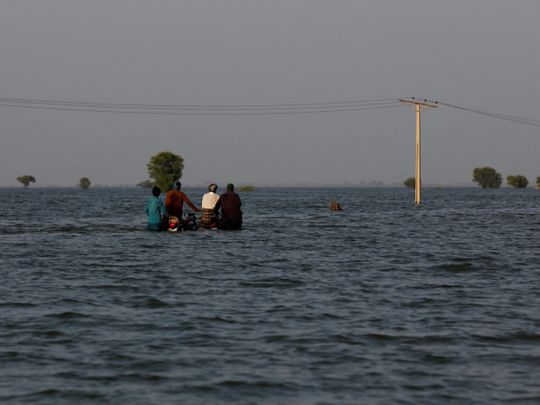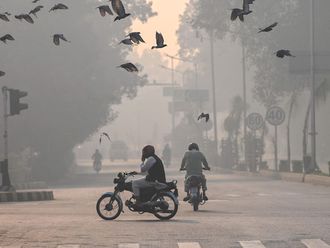
Islamabad: Pakistan is diverting water from its biggest lake to prevent a retainer wall from bursting, which would worsen deadly floods in the southern Sindh province.
About 30,000 cusecs of water — some 850,000 liters per second or enough to fill an Olympic-size pool in about three seconds — is being diverted to the outskirts of Sehwan. Even so the city, along with Dadu and Mirpurkhas, is in danger of flooding, Chief Minister Murad Ali Shah said in a briefing on Tuesday.
Manchar lake rose to a dangerously high level and a second breach was made September 5 to lower the water level, which will take a week, Shah said. The government didn’t immediately respond to a request on Wednesday seeking comment on a Washington Post report that said the lake had burst its banks.
Torrential rains have flooded about a third of the South Asian nation, killing more than a thousand and forcing half a million people into relief camps. Damage from the floods will be far greater than $10 billion, according to Pakistan’s planning minister.
Pakistan has also warned about another rain spell in mid-September that can worsen the current situation.
Damage ‘far greater’ than $10 billion
Meanwhile, the planning minister said the damage from the floods will be “far greater” than $10 billion.
As officials are still tallying the cost of heavy flooding that has claimed more than 1,300 lives, the latest assessment shows the damage will be worse than the initial forecast. The final value will take six to eight weeks to determine, said Ahsan Iqbal, the minister of planning and development, adding that the climate disaster is due to the actions of the developed world.
“All those countries that contributed to global warming have a responsibility to help us now and be partners in rehabilitation and rebuilding,” Iqbal, who’s leading the country’s flood relief efforts, said by phone. “This tragedy is not of our own making. It’s due to global warming.”
The South Asian nation, which was already reeling from dwindling currency reserves and inflation at the highest in decades, is now facing losses from a terrible natural disaster. More than a third of the country is under water and about half a million people have been forced into relief camps. With crops and livestock swept away, the government has warned of a looming food crisis.
About 45 per cent of the cotton output, one of Pakistan’s most important cash crops and commonly referred to as “white gold” , has been destroyed. The country will have to spend $3 billion to import the raw material for its textile industry, which is the top foreign exchange earner, Iqbal said, citing initial estimates.
A surge in food costs and ballooning import bills will add strain to the Pakistan economy. The country has just secured a $1.16 billion loan from the International Monetary Fund to avert an imminent default.












